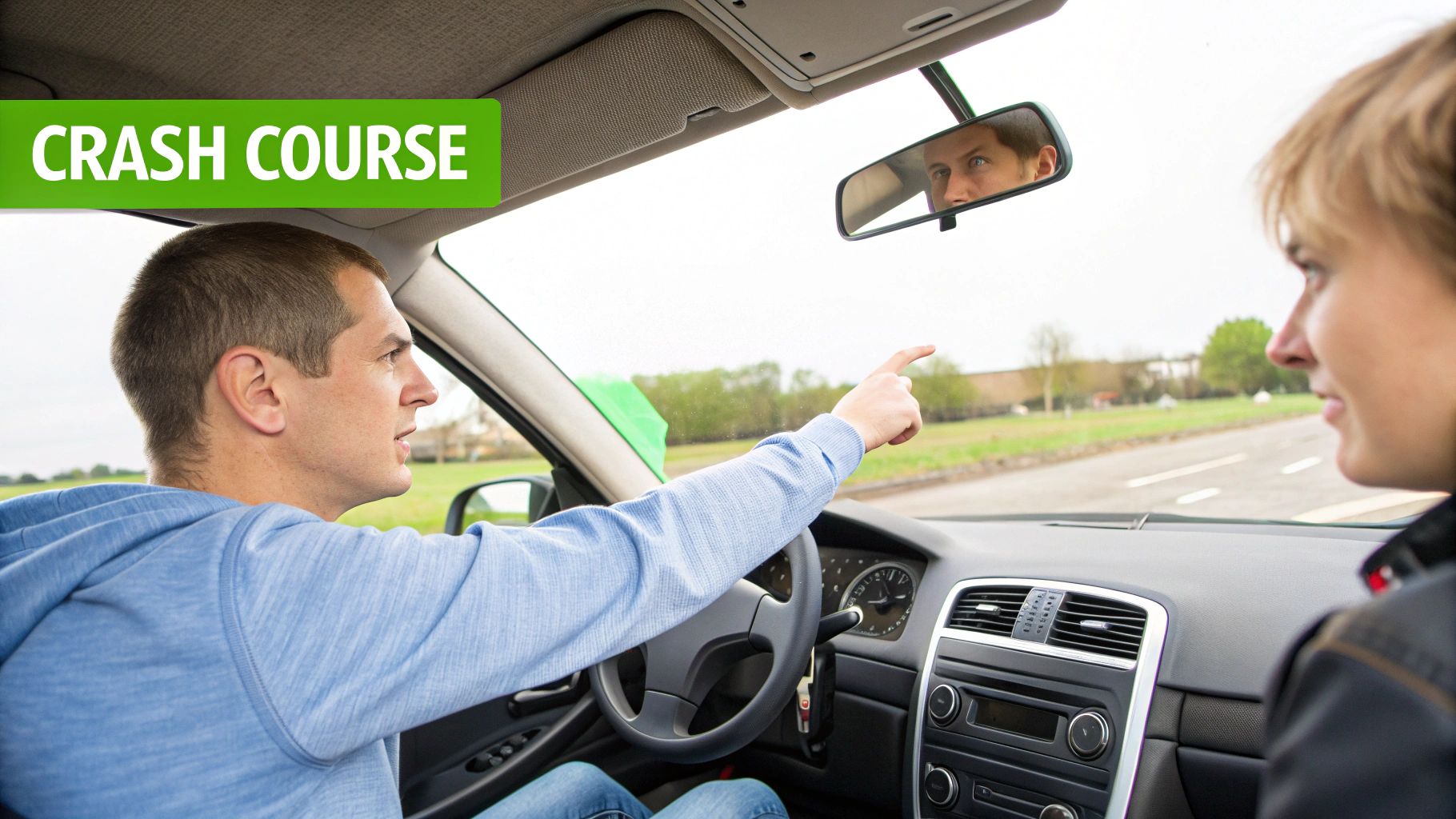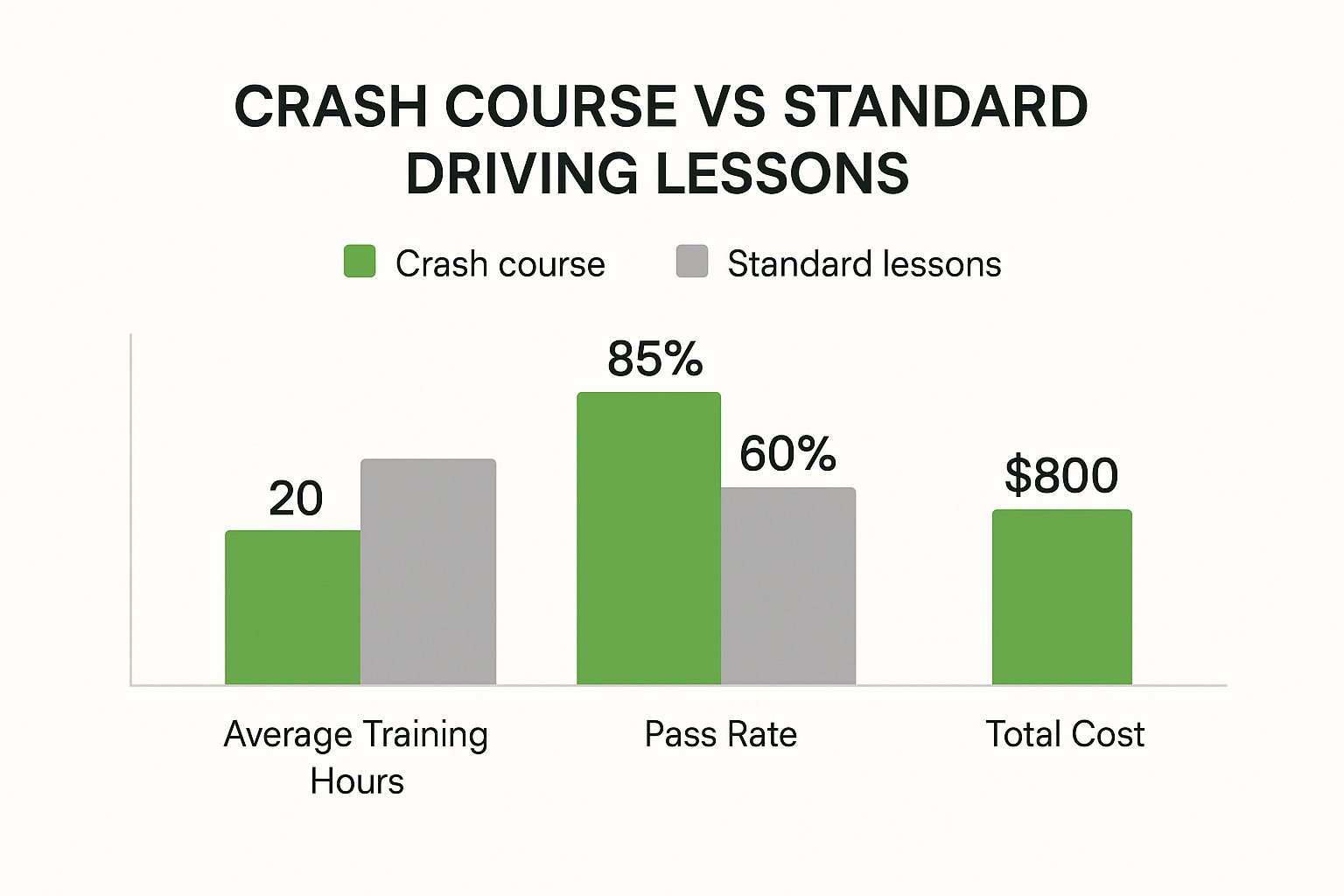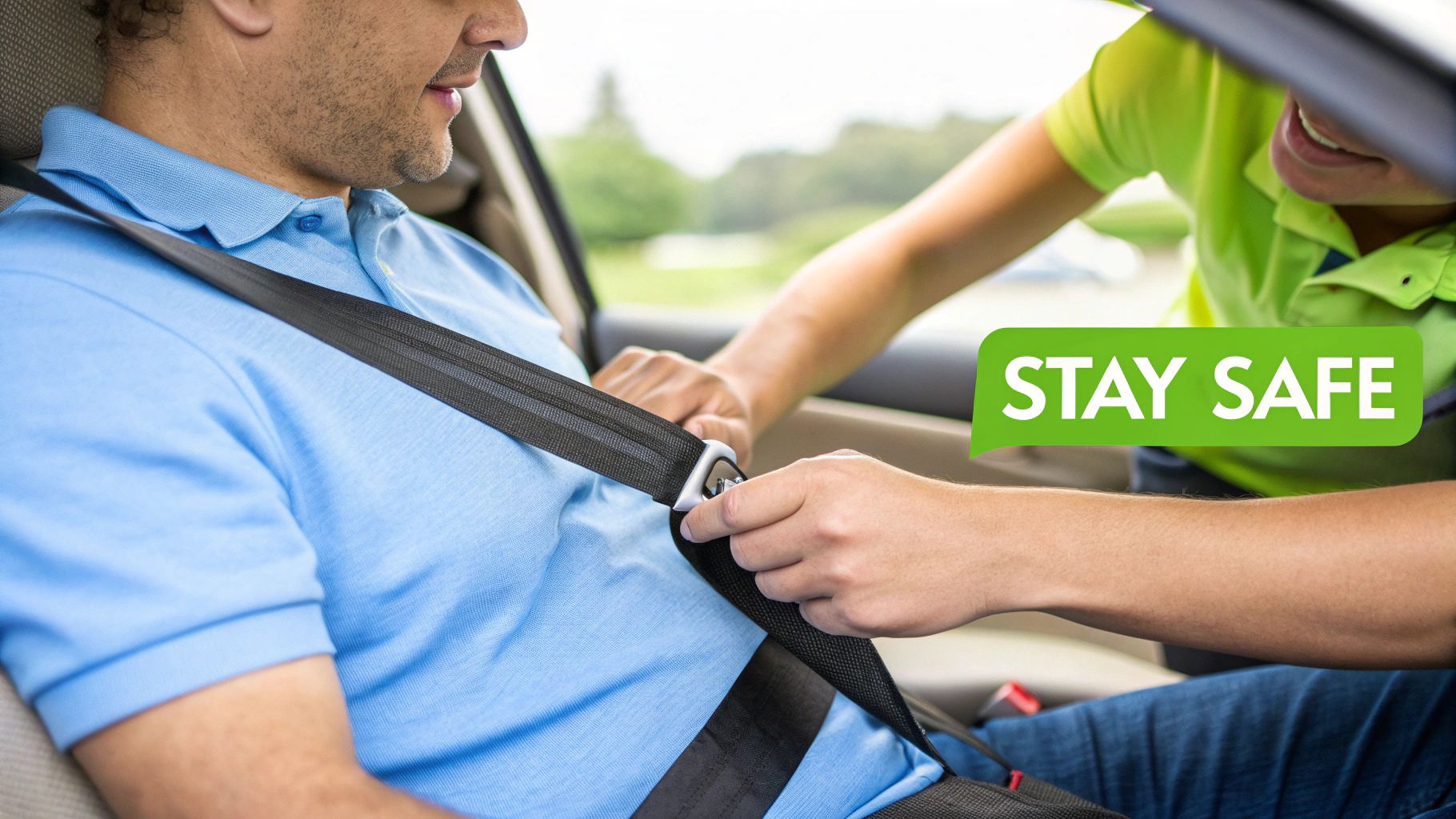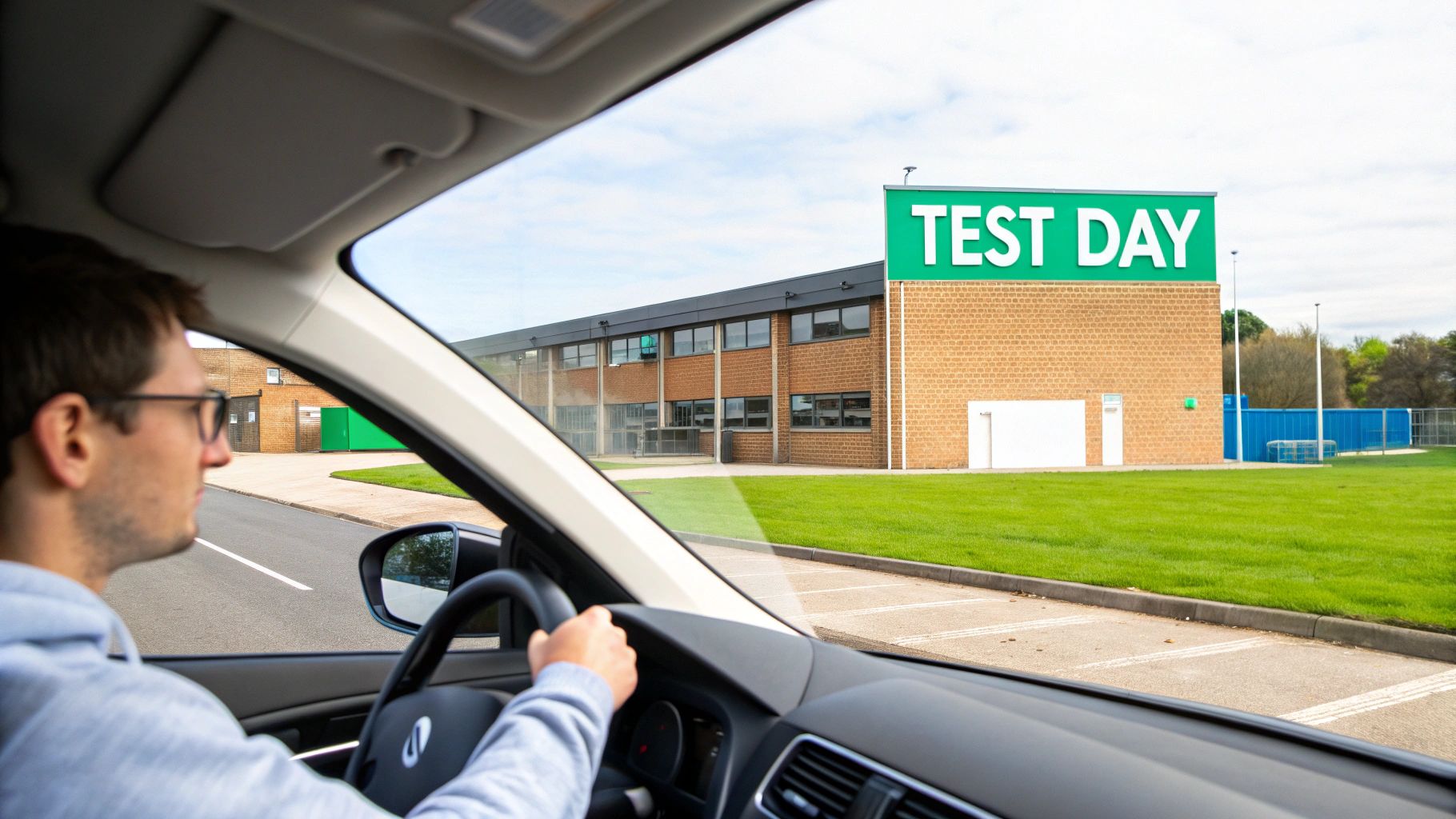Beyond the Basics: What Crash Course Driving Really Means

Crash course driving lessons might conjure up images of hurried, intense learning. However, the reality is much more nuanced. These condensed programs, typically lasting 1-2 weeks, provide a fundamentally different approach to learning compared to traditional weekly lessons. The intensive structure, often involving 4-6 hours of daily instruction, isn't simply about speed; it’s about immersion.
This immersive learning environment encourages rapid skill development through consistent practice and instant feedback. It’s similar to learning a musical instrument: frequent, shorter practice sessions are more effective than sporadic, longer ones. This concentrated practice builds muscle memory and reinforces proper techniques, leading to greater confidence behind the wheel. This method benefits various learners, from busy professionals seeking a fast track to a license to those needing a refresher after time away from driving.
Who Benefits Most From Crash Courses?
Crash course driving lessons are especially well-suited for people with limited time. For instance, university students on holiday or busy professionals with demanding schedules can dedicate a concentrated block of time to learning. Also, those with prior driving experience might find a crash course ideal for honing their skills and preparing for the practical driving test.
Check out our guide on fast-tracking your driving skills. It's important, however, to address any concerns about whether this accelerated method compromises safety or comprehensiveness.
Safety and Thoroughness in Crash Courses
Reputable crash course providers maintain high standards and follow DVSA guidelines, just like traditional driving schools. The structured curriculum covers all the necessary driving skills and knowledge required for safe and confident driving. The UK driving school industry is expected to generate about $544 million by 2025, highlighting the strong demand for driving instruction.
The average cost of a single lesson is approximately £23, and learners generally require around 47 hours to pass, totaling roughly £1,080. A decline in the number of driving instructors, however, could impact lesson availability and prices. This underscores the value of efficient learning programs like crash courses. More detailed industry statistics can be found here.
These intensive courses aim to equip learners effectively, despite industry difficulties. The emphasis on concentrated learning doesn't mean cutting corners on safety. Instead, it provides an alternative way to achieve the same outcome: becoming a proficient and safe driver.
The Real Benefits That Make Crash Courses Worth It
Crash course driving lessons offer more than just a fast track to your license. These intensive programs immerse you in the learning process, maximizing skill retention and building confidence in a way traditional weekly lessons often struggle to match. This concentrated approach minimizes the skill regression that can occur between weekly lessons, keeping your momentum strong and accelerating your overall learning.
Immersive Learning and Continuous Feedback
Crash courses provide continuous feedback, allowing instructors to immediately address any developing bad habits and reinforce good driving techniques. This constant feedback loop fosters rapid improvement. Instructors can tailor their approach to your specific needs each day, building on your strengths and addressing weaknesses. This personalized attention is invaluable for rapid skill development.
The Financial Perks: More Than Just Discounts
Bulk booking discounts are common with crash courses, but the real savings often come from the reduced total hours required. This efficiency stems from the focused nature of the training and the minimized risk of needing extra lessons to regain lost skills. For example, if you quickly master a skill, your instructor can immediately move onto the next topic, preventing wasted time and maximizing your investment.
To help illustrate the key differences between traditional lessons and crash courses, we've compiled a comparison table:
To better understand the differences between these two approaches, take a look at the following table:
Table: Traditional vs. Crash Course Driving: The Complete Picture
Description: This comprehensive comparison reveals the true differences between traditional weekly lessons and intensive crash courses across multiple factors including time investment, skill retention, instructor attention, cost efficiency, and suitability for different learning styles.
| Factor | Traditional Weekly Lessons | Crash Course Lessons |
|---|---|---|
| Time Investment | Spread out over weeks/months | Concentrated over a short period (e.g., 1 week) |
| Skill Retention | Can be affected by time between lessons | Improved due to consistent practice |
| Instructor Attention | Divided between multiple students throughout the week | Focused attention during the intensive period |
| Cost Efficiency | Potentially higher overall cost due to longer learning period and risk of extra lessons | Potentially lower overall cost due to fewer total hours |
| Suitability for Different Learning Styles | Suitable for those who prefer gradual learning | Ideal for those who learn best through immersion |
As the table highlights, crash courses offer a concentrated learning experience that can be more efficient and effective for certain learning styles. The focused attention from instructors and consistent practice contribute to improved skill retention.
The infographic below further compares crash courses and standard lessons:

The data illustrates that crash courses often involve fewer training hours (20 vs 40), boast higher pass rates (85% vs 60%), and can be more cost-effective (£500 vs £800). These findings highlight the potential financial advantages of a concentrated learning approach, making crash courses a compelling option for learners in the UK.
The Psychological Advantage: Confidence Through Quick Progress
Crash courses are designed to build confidence quickly through consistent daily progress. This steady advancement creates a powerful sense of achievement, motivating you to push further. Conquering such a significant skill in a short timeframe is empowering and provides a substantial psychological boost. This boost in confidence often translates to better performance behind the wheel.
Moreover, these courses often include targeted practice on challenging driving manoeuvres, allowing you to master these skills efficiently. This targeted approach ensures that you feel prepared for any situation you might encounter during your practical driving test and after you receive your license, setting you up for success on UK roads.
Is Your Learning Style Made For Crash Course Success?
Crash course driving lessons offer a tempting shortcut to getting your driver's license quickly. However, it's essential to honestly assess whether this intensive learning style suits your personality and current situation. It's not just about speed; it's about understanding how you learn best.
Different Learners, Different Approaches
For some, the focused nature of a crash course is perfect. Imagine a student who thrives under pressure, absorbs information rapidly, and easily adapts to new challenges – this learner often excels in intensive learning environments. Consider also someone with some driving experience, perhaps needing a refresher on specific skills or quick preparation for their test. Crash courses can be incredibly effective in these scenarios.
However, crash courses require significant commitment. This means dedicating yourself to long daily sessions, often 4-6 hours of focused learning, and maintaining concentration throughout. It also means processing and implementing feedback quickly.
Challenges and Triumphs: Real Student Stories
Many students find the sheer volume of information presented daily the biggest hurdle. Effective note-taking, evening review, and even visualization techniques can be vital for processing everything. Some learners also experience temporary plateaus, which can be discouraging. For example, a student might master parallel parking one day but struggle the next. This is normal in intensive learning. Persistence, a positive attitude, and open communication with your instructor are key to overcoming these challenges.
As of mid-May 2025, the UK has a backlog of over 600,000 learner drivers awaiting tests. This makes crash courses even more attractive for those seeking quicker licensure. Learn more about the current driving test backlog here. This increased demand highlights the need for flexible and efficient learning options.
Addressing Individual Needs
Crash courses aren't a one-size-fits-all solution. Learners with anxiety, attention difficulties, or specific learning preferences must consider these factors. Does the pressure of intensive learning worsen existing anxieties? Would shorter, more spread-out sessions be more effective for you?
Choosing a driving school that recognizes individual needs is crucial. Look for providers like Fast Pass Driving Courses that offer varying intensities, from semi-intensive to fully immersive programs, and prioritize personalized instruction. By honestly evaluating your learning style, you can decide whether a crash course is the right path to driving success. Remember, it's about finding the best fit for you, not just speed.
Finding Your Perfect Crash Course Driving Match

With the increasing number of crash course driving lessons available, finding the right one can be challenging. This section will guide you through the process of selecting a worthwhile program. Understanding how courses are developed can be helpful in appreciating the intensity and focus required for a crash course. You can learn more about this process through resources like custom course development. This knowledge will be particularly useful when comparing different providers.
What Sets Top Crash Course Providers Apart?
Several key features distinguish exceptional crash courses. Look for instructors approved by the DVSA (Driver and Vehicle Standards Agency) with a strong background in intensive teaching methods. These instructors possess the skills to deliver effective learning in a condensed timeframe.
Also, pay close attention to the provider's first-time pass rates. A high success rate indicates the program's effectiveness and the quality of instruction.
Choosing the Right Intensity Level
Crash courses cater to different learning styles and schedules by offering varying intensity levels. Semi-intensive courses typically provide 10-15 hours of instruction per week, offering a balance of flexibility and accelerated learning.
For those seeking full immersion, ultra-intensive courses offer 30+ hours a week, maximizing learning time and speeding up progress.
The Questions You Should Be Asking
Beyond the standard information, some critical questions often go unasked. Be sure to inquire about contingency plans. What happens if you become ill or need to reschedule? A reputable provider will offer flexible options.
Investigate the post-course support available. Does the school offer additional resources like mock tests or refresher sessions? Finally, assess the quality of the training vehicles. Modern, well-maintained cars enhance the learning experience and reflect the provider's commitment to quality.
Decoding Testimonials and Spotting Red Flags
Testimonials and reviews can offer valuable insights. However, look beyond star ratings. Focus on reviews detailing specific experiences and improvements in driving skills. Be wary of generic praise.
When considering pricing, beware of unusually low costs or hidden fees. Transparency is crucial. Compare the total price, including any additional charges, with the number of hours offered to determine the true hourly cost.
Crash Course Formats: A Breakdown
To help you compare different course formats, the following table summarizes common crash course structures available in the UK:
Crash Course Formats: Finding Your Perfect Match
This detailed comparison breaks down the various crash course driving lesson packages available across the UK market, helping you identify which format aligns with your learning style, schedule constraints, and budget considerations.
| Course Type | Duration | Hours Per Day | Ideal For | Typical Price Range |
|---|---|---|---|---|
| Intensive | 1 Week | 6-8 | Learners with some experience or needing a refresher | £500 – £800 |
| Semi-Intensive | 2 Weeks | 3-4 | Learners who prefer a more balanced pace | £400 – £600 |
| Residential | 5-7 Days | 6-8 | Learners from outside the area or seeking total immersion | £800 – £1200 |
| Refresher | 2-3 Days | 4-6 | Drivers needing to brush up on specific skills | £200 – £400 |
While this table offers a good overview, remember that prices may vary based on location, instructor experience, and the type of vehicle used.
By asking the right questions and thoroughly researching providers, you can find the perfect crash course to suit your needs, budget, and learning style, setting you on the path to becoming a confident driver.
Maximizing Your Investment: Crash Course Success Secrets

Even the best crash course driving lessons require a strategic approach. This section reveals the secrets to maximizing your investment in a crash course and achieving driving mastery. Success in these intensive programs depends on preparation, efficient learning, and effectively managing the challenges of condensed learning.
Preparing For The Intensity: Pre-Course Essentials
Before your crash course begins, laying the groundwork is crucial. Mastering the Highway Code and passing your theory test beforehand frees up valuable practical lesson time. This allows you to focus solely on developing driving skills. Think of it as building a house: you need a solid foundation (theory) before the walls and roof (practical skills). Light physical exercise can also improve stamina for those long hours behind the wheel.
For additional tips on accelerating your learning journey, you might find this resource helpful: How to learn driving fast.
Managing Information Overload: Effective Learning Strategies
Crash courses deliver a large amount of information quickly. Effective strategies are essential for managing this knowledge influx. Strategic note-taking during lessons, focusing on key instructions and difficult areas, helps consolidate learning. Regular evening review reinforces what you've learned, preventing information overload and improving retention. Visualization techniques, like mentally rehearsing maneuvers, further solidify skills between sessions.
Overcoming Challenges: Plateaus And Mental Fatigue
Intensive learning can lead to temporary plateaus. One day you might perfect a maneuver, and the next it feels impossible. This is perfectly normal. Maintaining a positive attitude, consistent practice, and open communication with your instructor are key to overcoming these hurdles.
Mental fatigue is also common during intensive courses. Prioritizing proper sleep, nutrition, and stress management supports your cognitive performance throughout.
Driving test pass rates have seen a slight decline, falling from 49.8% in 2020-2021 to 48.2% in 2023-2024. This highlights the importance of effective preparation and the potential benefits of crash courses. You can find more detailed statistics here.
Choosing The Right Driving School
Selecting the right crash course provider is paramount. Look for a professional online presence; consider their website design as an indicator of their overall approach. Choose instructors with DVSA approval and experience in intensive teaching methodologies. A school's first-time pass rates can also indicate program effectiveness. Ultimately, crash course success depends on preparation, smart learning strategies, and the right provider. This structured approach equips you with the skills and confidence to excel on the road.
From Crash Course to Test Success: The Final Hurdle
After an intensive period of crash course driving lessons, the practical driving test can feel like a daunting challenge. This section helps you prepare for test day, using insights from examiners and successful crash course graduates.
The Final 24 Hours: Preparation Is Key
The day before your test should focus on solidifying your skills and boosting your confidence. A final driving lesson serves as a warm-up and an opportunity to address any remaining concerns. This isn't the time for new maneuvers; it's about reinforcing existing knowledge. Consider it a dress rehearsal before the main event. Practicing routes near the test centre can familiarize you with the testing environment.
You might find value in this resource: How to pass your driving test first time. It offers practical tips and advice to improve your chances of success.
Managing Test Anxiety: Stay Calm and Focused
Test-day nerves are perfectly normal, especially after intensive learning. However, excessive anxiety can hinder performance. Practice simple breathing exercises to manage stress. Deep, slow breaths regulate your heart rate and promote clear thinking. Focus on the task at hand and visualize a successful test. This positive visualization technique can significantly reduce anxiety and improve your focus. Remember, the examiner is there to assess your driving ability, not to set you up for failure.
Adapting to Test Conditions: Subtle But Crucial Differences
The test environment inherently differs from your practice sessions. Test routes often incorporate unfamiliar roads to evaluate your adaptability. Be prepared for varying traffic flow and road conditions. Pay close attention to road signs and markings, particularly in new areas. Consistently demonstrate safe driving habits, even in unexpected situations. This adaptability is a crucial component of safe driving and a key factor examiners assess.
The Preparation Checklist: Everything You Need
A thorough checklist helps ensure you're fully prepared:
- Provisional Driving Licence: Make sure it's valid and easily accessible.
- Theory Test Certificate: Confirm its validity and have it ready.
- Vehicle Documents: Verify insurance, MOT, and road tax are current.
- Appropriate Footwear: Wear comfortable shoes that facilitate proper pedal control.
- Mental Preparation: Visualize success and maintain a positive mindset.
Contingency Planning: Handling Both Outcomes
Prepare for both passing and the potential need for a retest. Knowing how to proceed in either scenario reduces stress. If you succeed, celebrate responsibly and start exploring car insurance options. If you require a retest, review the examiner's feedback, schedule additional lessons to address weaknesses, and book a new test. A retest isn't a failure; it's another learning opportunity.
By following these guidelines, you can successfully transition from your crash course to test day, confidently navigating this final hurdle toward becoming a licensed driver.
Ready to fast-track your driving journey? Visit Fast Pass Driving Courses today to find the ideal crash course and start mastering the road in record time!

